- Home
- Claire North
The Gameshouse Page 7
The Gameshouse Read online
Page 7
—I know grief, she replied,—and rage. I know them so well that I think they have burnt a part of me to ash, leaving only the shape of what they were inside me, and not the feeling itself. I do not care if you betrayed Belligno’s child to his death. I care that you cannot be caught at it.
—There is no proof that I did anything, he replied.—There never was.
—Then that is enough.
Chapter 22
And then she stands before Marco Belligno and says:
—I need you to cast your lot in with Angelo Seluda.
Belligno, the fish merchant’s son, who has married his daughters off nearly well enough that people no longer dare mention his origin (at least, not to his face) cannot hide his astonishment.
—Are you mad?! he exclaims.—Are you looking to die? Do not think that because you are a woman I will not split you in two where you stand, are you mad? Now I know the old man cannot have sent you unless he despises you and hopes that I will do his dirty work, destroy you where you stand, in which case you are betrayed, or you are not and he is mad, you are mad, all things are madness!
—You are not going to reach the Supreme Tribunal, she says simply.—Faliere and Condarini have the election too closely held. The most you can hope to do is push your support one way or the other for a suitable consideration. Faliere and Condarini will not bother to bribe you because they assume that Seluda, being your enemy, will take action against you instead. Either way, and however you view the argument, your support—your considerable yet insufficient support—is something that must be either won round or destroyed. I wish to win you round.
—I would never…
—I believe you lost a son?
Silence now. He is silent, though whether he will burst or whether he will stumble, who can say? She pushes on.
—The rumour is that Seluda sold him to a Milanese man who believed your son had violated the honour of his sister. I do not believe that Angelo Seluda had the opportunity, though doubtless he had some motive in this. Regardless, no one would confess to having kidnapped and murdered your child, and so you must persist in ignorance. Ignorance can be worse than knowing, can it not? I had an agent make some enquiries. He has a cousin in Milan who is physician to certain well-placed gentlemen. I can resolve this matter for you, should you wish it done.
—Resolve?
—Should you wish it so.
—My son… is dead.
—Yes.
—You know?
—Yes.
—You can prove it? You can prove that he died?
—Yes. And I can deliver to you his remains, with proof that they are his, for proper burial. And I can give you the man who killed him.
—And for this you want me to sacrifice my family honour, my family name?
—No. For this I ask that you make peace. There is a great deal of profit to be made between you and Seluda. Divided, you are easy prey to the machinations of Faliere and Contarini: they know that while you war together you cannot war against anyone else. Peace will bring great opportunities, and more. More, that only peace can bring.
And for a moment, it seems as if he is considering.
Chapter 23
At night, as she returns, she knows she is watched.
This time she stops in the middle of a square and turns and looks, and does not see the watcher but a glimpse of coat, a sliver of boot as her follower turns into the shadow. She stands straight to show them that she is not afraid. Her mask is bright in the moonlight, and for a while there she stays, waiting, until at last the cold settles on her and she turns and returns home, and is followed no more.
Chapter 24
Belligno sends word.
Bring me the body of my child, he says,—and bring me the man who wrought his death, and I am yours.
The man who wrought his death is in Milan, but she has planned for this too, and knows just the card to play.
Galliard Viole, the Fool. He is a Frenchman who, having discovered himself unremarkable in France, travelled to Italy where the novelty of his being French might be at the very least somewhat more entertaining to the mighty. A short man, he is neither excessively witty nor particularly droll, but has mastered some of the essential arts of being a courtier as heaping liberal praise on the mighty and heavy scorn on those whom he predicts will shortly fall. Indeed, it is this latter characteristic—the ability to lose friends wisely—which has doubtless kept him alive as he journeys, ever hopeful, through life.
She meets him by the pier to Forli, hands him one thousand ducats, a sword and a pistol.
—Ah, Milan! he exclaims joyously.—A beautiful city, if somewhat humourlessly run! I have missed its women.
—You do not strike me as particularly foolish, she confesses as he pulls his cloak tighter about his shoulders.
—Do I not? he asks brightly.—That is very strange. I played in the Gameshouse when I was young, and cheated in order to win. The very same night, the umpires found me, and took me before the Gamesmaster, who said that I had broken the laws of civilised men and would pay the highest forfeit and become a servant to the house for a term of one hundred years, until my lesson was learned and my debt was paid. I laughed in her face and told her that she was a ridiculous, over-puffed old lady in a stupid dress, and the next day my wife died, and the day after that my only child, and on the third day my father fell ill, and on the fourth I knelt at her feet and kissed her white pointed shoe and begged her to stop, told her I was hers for ever, and she asked if I knew now what it meant to be a fool. That was seventy-three years ago. In twenty-seven years, I think she will let me die.
Thene stares astonished at this man, and for a moment does not know where she stands, or what she does, or even who she is to have come to this pass, to be standing now hearing this tale. Is she not Thene, the Jew’s daughter? Is this earth not the earth, is the sky not the sky, are those centres of her world no more than the afterburn of the setting sun, a reflected illusion on the horizon?
Then the Fool breaks out into a great guffaw of laughter, slaps her on the back and says,—You are delightful, dear lady, simply delightful—thank heaven for Milanese girls!
And like that, he is gone.
Chapter 25
We remember this man, do we not?
Too easy, too easy for a player, lost in their own cleverness, to forget the moves of other clever men!
A great face of hair, two tiny eyes and a little nose, the rest lost beneath black beard and swagger. He is a proud man, this Knave of Swords, for who would not swagger who had seen death as many times as he has and lived to tell the tale? There is no monarch in this world, no pope or prince that can command him, for he—why, he has seen the fall of men and heard the growling at hellish gates and defied them all.
He was sent to the house of Contarini, that most elusive of all the pieces, a man whose fear is almost greater than his sense—or perhaps rather, as time may show, perfectly matched to that scale of disaster that yet hangs over him. We have watched him on and off these last few days as he spoke to captains and sergeants, made enquiries about doors, noted quietly to himself each motion of every messenger, each movement of every spy, each coin that falls upon the ground at Contarini’s boot. Contarini, Contarini, you are being most cleverly played by that unseen man who stands behind the shuttered window. Tiapolo is lost, Seluda has yet to make its move but you, Contarini, you have united Church and state in the name of making money. Few things are as likely to win an election as this!
A message comes to our Knave of Swords, word of a relic hidden somewhere about Contarini’s belongings. Destroy the relic, you destroy the excuse the bishops have to make their towers of gold, you destroy the profits that strangers will have in building these palaces to theological expense.
So the command comes down—find the relic. Destroy it. Let us stop Contarini’s greatest play before he makes it.
So our knave searches, making most discreet enquiries and abasing himself before the mi
ght of others. It doesn’t bother him, a proud man, to grovel before men he knows are lesser than he. His cleverness exceeds theirs, is clearly shown to exceed theirs with every lie he tells and quiver he makes—how clever indeed that a man so proud should slobber so extemporarily!
When the end comes, it is without warning. He did not see it coming, did not dream that it was coming, but a stranger whose face is hidden by a mask held a card in his hand, the Sun, whose light shines into every corner and beneath whose gaze all things are revealed—why yes, even our ally, our friend, our rogue sent into another’s den.
He stands upon the bridge, feels a hand upon his arm, hears the words,—May we speak?
He turns, and the club that strikes his skull breaks both his jaw and two of his teeth in a single bounce. It is a crude weapon, perhaps fashioned from a cabinet-making project that failed, or chipped from the branch of a rotting tree. Can its owner not afford anything better?
(Yes, he can, but he waited too long to acquire his wealth and invested too much pride in poverty, so now that he flaunts his tatty clothes, his thin shoes and in his proud humility, it is perhaps fitting that he now serves as our sergeant’s nemesis.)
They beat him, our Knave of Swords. They beat him so no one can tell between what is swollen and what is broken, whether his features were ever really human. All red, red, the water runs red beneath him, his clothes are saturated with it, so that red seeps from velvet, and now they take him without word, without ceremony, to the house of Angelo Seluda, and three men hold him up while a man in a mask looks towards the high windows of this place, and waits.
He waits until she appears—Thene, her mask as empty as his—and sure now that he has her attention, turns to one of the men who has helped carry our wounded knight to this place. This man pulls a small axe from his belt, of the kind that might be used to cut away heavy ropes from a ship under sail. Down the axe falls once, and twice, and away they go, leaving the Knave of Swords on the cobbles before Seluda’s door.
They carry him inside, and she herself descends with a hessian sack. She picks up his right hand by the tip of the little finger, not looking at her work, then picks up his left, pinching it tight, thumb on the soft palm, finger on the still hairy top. The blood drips through the sack as she walks, and she tells herself that it is but flesh, is but meat, that bounces at her side.
Earth, sea or fire? For a moment she cannot decide, before at last throwing the bag into the ocean, weighted with a stone. It is blissful how fast the waters claw these fingers down, and how little blood is on her hands as she washes them in the fountain before the church.
When she returns, the Knave of Swords is dead.
The blood loss was too great, the shock, the pain—or perhaps with his last glimmer of awareness, as the mercenary saw his hands struck from his body, he resolved that life itself was not worth the living, and let go of it with the same force of will which, until that time, he had lived it.
Seluda says,—Who was he?
—A piece, she replies.—He was a piece.
—Why did they do this?
—I sent him to the house of Contarini to find an object. The player who runs that piece has sent him back.
—I thought players didn’t hurt other players.
—You are correct. Nowhere in the rules does it say what may happen to our pieces.
Angelo Seluda is silent at this. We do not think he is a foolish man, and if he did not know before what it is to be played, perhaps he does now.
She retires to her room; does not look back.
Chapter 26
The coin turns, the coin turns.
She rolls it between her fingers.
The coin turns, and she does not understand.
Chapter 27
She returns to the Gameshouse.
Faliere’s player does not come there any more, nor does Contarini’s. The game is too advanced for them to dally with lesser matters.
She does not spare much thought to Tiapolo.
—You play? he asks.
We know this man too, do we not? Silver in the sleeves, a face that is too tired to be young, too soft to be old. It is as if the age has been rubbed away from him, leaving a featureless surface behind which smiles from habit, not from humour. We called him Silver before, the man who challenged her to play, and now he sits opposite her once more but does not move towards the pieces or the dice, but rather asks again:
—You play? Here, still? I thought you were engaged in higher matters.
—I find that the games played here helps focus my mind.
—You should be careful. Others will watch you, learn your style, your techniques. Even in a simple game of dice, your character can become visible, and certain deductions will be made.
She smiles at this and says nothing, and he is surprised.
—You… want to be seen?
Admiration, incredulity, disbelief, wonder, delight—why, all these things we may hear in his voice, strange to the sound.—You want players to observe you playing?
—Would you like a game? she asks.
—What would you propose?
—Cards. For every hand you win, you may ask a question. And for every hand that I win…
—I understand.
—Then let’s play.
She divides the deck.
Deals the cards.
At first, she is rusty, slow to find the pattern of it, and he asks five, six, seven questions in a row.
—Are you winning your game?
—No.
—Can you win?
—Perhaps.
—Do you like your piece, the king you must get a crown for?
—No.
—What do you want, if you win?
—Freedom. The freedom that only victory can afford.
We would imagine, would we not, that after losing nine hands in a row, she would be disheartened, she would fold, but on the tenth hand the game turns, fast now, and with a brisk efficiency she starts reclaiming the cards, taking hand after hand as quickly as the questions come. So now she asks:
—Are you a player in the higher league?
—Yes.
—How long have you played?
—I think… centuries.
—Are you lying to me?
—No.
—Have you been sent to influence, help or hinder me?
—That sounds like three questions.
—I think, if you listen, it is only one, but should it be a concern for you I can break it into three separate parts, win three separate hands and get the answer either way.
—Did you let me win? he asks.—Did you play me?
—You will have to win another hand before I answer that. Now—my questions, please.
—No, no one sent me to interfere with you in any way. I saw you alone and wondered if you would like to play, and here we are, playing still.
—Does the Gameshouse exist outside Venice?
—Yes, but I think you need to find a better way of asking the question that you wish to ask.
The next hand she plays too quickly and loses, and is barely able to hide the intake of breath, irritation at herself, that slips through her lips as he takes the hand.
—Did you let me win our first few hands? he asks.
—Yes.
—Why?
—The questions you ask are indicative of who you are, and the information you hold. It allows me to formulate my own questions more successfully.
At this he laughs, throwing his cards onto the table and leaning back. For a moment he sits there, shaking his head, arms folded, legs crossed, until at last he says,—Lady, I do not know precisely what the situation is with the game you play outside these walls, but let me say that if you are playing it as well as you play me now, you cannot help but win.
—I have more questions, she says, indicating the cards between them.
—I do not think we should play this game any more.
—Why?
—A
game should be balanced, and there should be joy in it. I see neither any more. But you are eager, I think, for more answers, and it would be churlish of me not to give them. So I propose an accord, a deal struck between us alone.
—What deal?
—Not here, he replies.—I will visit soon, somewhere else, and we will discuss fairer terms.
—Do I have your word on that?
—You have seen me play. Would you value my word if I gave it?
She does not answer, and when we look again, both she and he are gone.
Chapter 28
A man in Milan.
He is no longer young, but has applied every trick he can to appear so. He wears a wig to thicken out his thinning hair, his stockings are tight, his shoes are curled, the colour of the cloth that tugs against his hips is vibrant orange, a garish, tasteless thing that no Venetian would approve of. He has a cap upon his head from which silver feathers sprout, and he wears no fewer than eleven rings upon his fingers, though secretly he knows only three are gold all the way through.
His name is not important, for he is less than a piece in this game, but we must take a moment now to sympathise with his coming predicament, for he is a man who had a sister, and that sister loved a boy of Venice, and he on learning of this slaughtered the boy and threw him into the river. For two years perhaps, he believed he was free from this crime—though he would not call it such, not crime, no, justice, justice for his sister, for his family, for his honour, justice—but now retribution comes.
It comes, it comes, and it wears the face of Galliard Viole, our foolish Frenchman, who approaches this stranger in the street and says,—Friend! Friend, my old friend, my brother, it has been so long! Let me buy you a drink!
He buys a drink, and another, and another, and soon both Fool and friend are mightily drunk, holding onto each other, kissing each other’s cheeks, roaring with merriment when their staggering tips one or both over to the ground, for how funny it is to be in good company! How noble it is to be loved, how great is the bounty of man, how little matter material things when there is the joy of humanity, of fellowship, of the communion of souls!

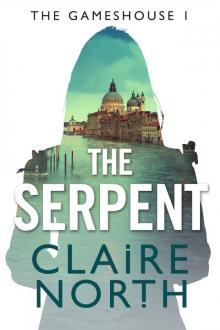 Gamehouse 01 - The Serpent
Gamehouse 01 - The Serpent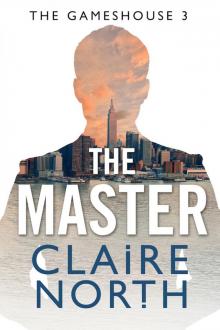 The Master
The Master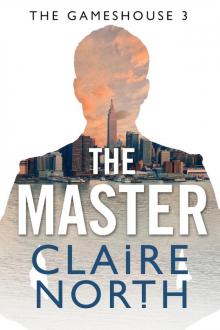 Gamehouse 03 - The Master
Gamehouse 03 - The Master The Thief
The Thief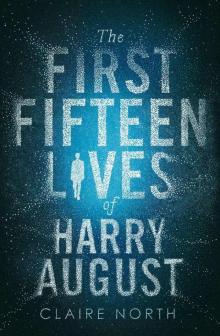 The First Fifteen Lives of Harry August
The First Fifteen Lives of Harry August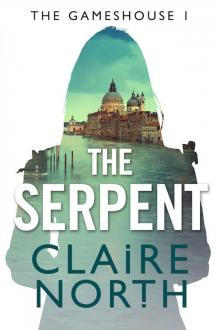 The Serpent
The Serpent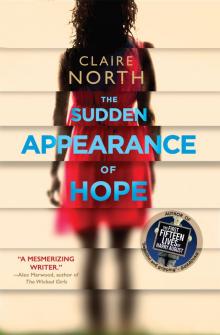 The Sudden Appearance of Hope
The Sudden Appearance of Hope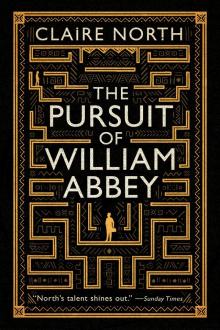 The Pursuit of William Abbey
The Pursuit of William Abbey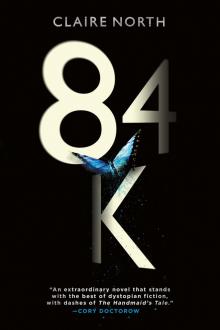 84k
84k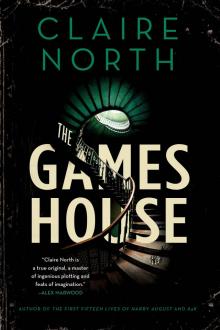 The Gameshouse
The Gameshouse Touch
Touch Sweet Harmony
Sweet Harmony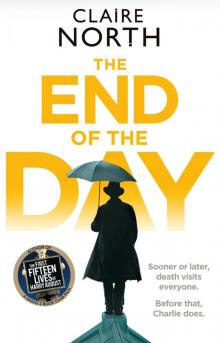 The End of the Day
The End of the Day Notes from the Burning Age
Notes from the Burning Age